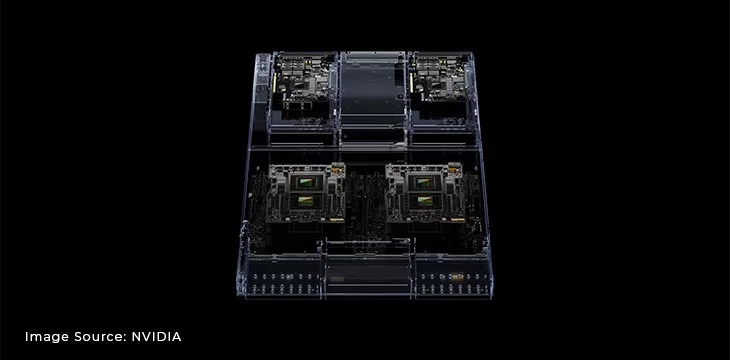|
Getting your Trinity Audio player ready...
|
Nvidia (NASDAQ: NVDA) has announced the launch of a new chip designed to power the next level of artificial intelligence (AI) systems amid stiffening competition from rivals.
Nvidia disclosed that its new chip builds upon the GH200 Grace Hopper and integrates with the pioneering HBM3e processor. The semiconductor maker confirmed that its new chip is tailor-made for generative AI and accelerated computing projects.
The new chip offers AI developers three times the memory capacity of existing chip models and three times more bandwidth. Nvidia CEO Jensen Huang said the new chip comprises “a single server with 144 Arm Neoverse cores” and its proprietary HBM3e memory technology.
“To meet surging demand for generative AI, data centers require accelerated computing platforms with specialized needs,” Huang said.
“The new GH200 Grace Hopper Superchip platform delivers this with exceptional memory technology and bandwidth to improve throughput, the ability to connect GPUs to aggregate performance without compromise, and a server design that can be easily deployed across the entire data center,” he added.
The new chip can reach up to 1.2TB of fast memory by connecting additional chips using the firm’s proprietary NVIDIA NVLink. Huang said operating in dual configuration mode will allow developers “deploy the giant models used for generative AI.”
Designed to “scale out of the world’s data centers,” the new chip offers a significant drop in the inference cost of running large language models (LLMs). The chip is expected to be open for sampling before the end of the year, but a full-scale rollout is projected in the second quarter of 2024.
Nvidia has been splurging significant semiconductor resources for the growing generative AI industry. The company teased an AI supercomputer platform to streamline the efforts of AI developers to launch their own LLMs, with many Big Tech firms indicating an interest in using the platform.
The new investments saw the firm’s valuations soar above $1 trillion for the first time in its history in the wake of rising AI adoption.
Stiff competition for generative AI
Nvidia controls over 80% of the AI chip market, but other semiconductor manufacturers are keen on snagging a chunk of Nvidia’s market share. Advanced Micro Devices (AMD) (NASDAQ: AMD) announced the launch of an AI chip that pundits say possesses enough technical qualities to challenge Nvidia’s dominance.
The rise of AI has led to a steep decline in the use of AI chips for digital currency mining activities. Some mining firms have announced a rebrand by eliminating “blockchain” from their names to indicate a diversification to generative AI.
In order for artificial intelligence (AI) to work right within the law and thrive in the face of growing challenges, it needs to integrate an enterprise blockchain system that ensures data input quality and ownership—allowing it to keep data safe while also guaranteeing the immutability of data. Check out CoinGeek’s coverage on this emerging tech to learn more why Enterprise blockchain will be the backbone of AI.
Watch: AI, ChatGPT, and Blockchain

 02-24-2026
02-24-2026 




